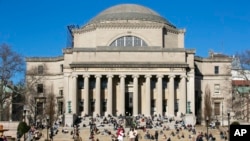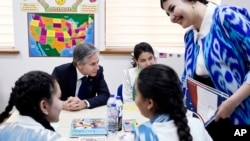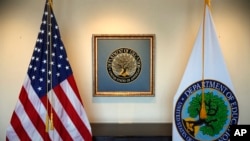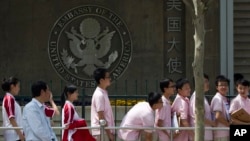Student Union
- By Sahar Majid
Miss District of Columbia 2019 Shares Her #MeToo Message
VOA Student Union's Sahar Majid interviewed 2019 Miss District of Columbia Katelynne Cox, who talked about issues including her pageant journey and advocacy organization.
Katelynne Cox was chosen as the 2019 Miss District of Columbia last month.
Cox, a native of Washington state, is the manager of fundraising and events at the U.S. Chamber of Commerce Foundation in Washington, D.C.
In the pageant, Cox was able to speak to her advocacy for the #MeToo movement.
Through the organization Silence Is Not Compliance, which Cox founded in 2016, she is providing rehabilitation resources to survivors of sexual assault and educating kids on how to prevent sexual violence.
Cox is a rape survivor, and works to inspire other women who have gone through similar trauma and have not been able to speak up.
“I am a survivor of sexual assault and was raped in college, and I wanted to turn my terrible experience into a way that could help others,” she said.
As she established Silence Is Not Compliance, Cox began lobbying for the victims for sexual assault before the U.S. Congress.
“I would argue right now, in our current policies, that victims are treated as tools for prosecution rather than victims deserving a rescue and that's what I want to change,” she said.
Before moving to Washington, D.C., Cox attended the University of Missouri where she received a Bachelor of Arts degree. She also has two graduate certificates in nonprofit and public management from the school.
Cox said she became involved with the Miss District of Columbia organization for several reasons. The Miss DC pageant, which is part of the Miss America program, offers over $25,000 in scholarships each year to contestants. The winner receives a $10,000 scholarship and there are a variety of other awards available for academics.
Cox said the scholarship was one of the reasons she got involved with the organization.
Every year, the Miss District of Columbia Scholarship Organization recognizes high-achieving women between the ages of 18 and 25 who have been living or working in Washington, D.C., for at least six months preceding the date of the pageant. The program’s website says that a contestant who is not a district resident can obtain a waiver by showing her education or employment status in the District of Columbia. There is no entry fee to compete. This year's event was held June 23.
The Miss DC organization has a partnership with Children's Miracle Network Hospitals – a Utah-based nonprofit organization that raises funds for children's health care.
“This organization is near and dear to my heart,” Cox said, adding it gave her another reason to become involved with the Miss DC organization. Cox has been working with Children’s Miracle Network Hospitals since she was a child.
In addition, the Miss DC organization provides contestants with an opportunity to pick a social impact initiative with which to become involved. “It was an amazing experience to promote my organization, Silence Is Not Compliance, as Miss DC,” Cox said.
This year, the Miss District of Columbia Pageant eliminated the swimsuit segment. It was a decision by the Miss America organization to replace it with onstage interviews of contestants.
Cox is grateful for the decision because it gave her an opportunity to talk about the #MeToo movement on stage and her experience as a survivor to connect with other survivors.
She highlighted her singing abilities for the talent portion.
“Well, my mom likes to say that I started singing before I could even talk,” she said, while telling the story of her musical journey.
Cox has worked with Red Hammer Records, a label based in Portland, Oregon, and released three albums during her teen years. She also had an opportunity to tour nationwide for her musical shows.
Cox believes scholarship programs, such as Miss America or Miss DC, provide young women with a platform to talk about social issues that need to be addressed.
“I think that inherently there is a problem with the thought that being involved in pageants is somehow sexually objectifying someone. I would argue that if you say that pageants are sexually objectifying me, then you are sexually objectifying me, not the pageant itself,” Cox said.
Cox is now gearing up for the 2020 Miss America contest, to be held on September 8 in Atlantic City, New Jersey.
See all News Updates of the Day
- By VOA News
International students discuss US campus culture shock

International students at De Anza College in Cupertino, California, talked about culture shock in an article in La Voz News, the student newspaper.
"It felt like a major culture shock. Everything was so different, from academics to mannerism," said a student from Mexico.
Read the full story here.
These are the most expensive schools in the US

High tuition costs along with housing and food expenses can add up for students at U.S. colleges and universities.
MSNBC looked at the most expensive schools in the country, with one costing more than $500,000 for a bachelor’s degree. (June 2024)
Uzbekistan students admitted into top US universities

Students from Uzbekistan are among the international students admitted to top colleges and universities in recent years.
Gazata.uz profiled some of the Uzbekistan students attending Harvard, Brown, Princeton and other U.S. universities. (June 2024)
- By Stella Hsu
Reports of visa checks, deportations worry Chinese STEM students in US

Geopolitical tensions and growing competition in tech between the United States and China appear to be spilling over into academia despite commitments from the world’s two biggest economies to boost people-to-people exchanges.
The United States remains the top choice for Chinese students seeking to study abroad with nearly 300,000 studying in American colleges and universities during the 2022-2023 school year. But reports of some cases that students and professors are facing extra scrutiny while passing through immigration and the deportation of others are raising concerns.
For Chen Xiaojin, a doctoral student studying semiconductor materials at a university in the Washington, D.C., metropolitan area, it has been six years since she returned to her hometown of Beijing.
At first, it was the COVID-19 pandemic that kept her from going home. But over the past two years, she has been deterred by accounts of Chinese students majoring in science and engineering being required to reapply for their visas upon returning to China.
She also says she is worried by reports over the past six months of Chinese students being deported, even at nearby Dulles Airport.
"My current research is relatively sensitive, and my boss [adviser] is getting funds from the U.S. Department of Defense, making it even more sensitive,” she told VOA. "I am afraid that I won't be able to return after I go back [to China]."
Chen says that if she did return to China, she would have to apply for a new visa.
In a report late last month, Bloomberg said it had found at least 20 Chinese students and scholars with valid visas who were deported at U.S. Customs since November and barred from reentry. The U.S. Customs and Border Protection Agency does not release relevant data.
Immigration attorney Dan Berger represented one Chinese student who was deported late last year. He tells VOA Mandarin that the student studied biological sciences at Yale University and was about to complete her doctorate.
She visited her family in China and got a new visa but was deported by customs at Dulles Airport and barred from reentering the country for five years. Berger said he did not see anything suspicious in the transcript of the conversation between the student and the customs officer.
"We have seen what seems like a pattern over the last six months of Chinese PhD students being turned around…. more than I've seen in quite a while," he said.
Matthew Brazil, a fellow at the Jamestown Foundation, said neither country seems willing to explain the situation. However, he believes that in most cases, the United States must have valid reasons for blocking visa holders from entering the country.
In some cases, the student’s background may not match what is written on the visa application. In other cases, customs agents may also find something that the State Department missed, and once they see it, they are responsible for taking action.
"I wish the Chinese side would be specific about their students who were refused entry,” he said. “The fact that both sides are mum on details and that the Chinese side is engaged with the usual angry rhetoric means that each has security concerns. And that says to me that there was good reason for the U.S. to stop these particular applicants."
Brazil also sees a connection between the entry denials and export control regulations issued by the United States in October 2022 that restrict China's ability to obtain advanced computing chips, develop and maintain supercomputers, and manufacture advanced semiconductors.
U.S. Customs and Border Protection is one of the law enforcement agencies authorized to investigate violations of export control regulations, he said.
"Beijing's intelligence agencies are known to focus attention on PRC [People's Republic of China] students and scientists headed abroad who study or work on dual-use technologies controlled under the Export Administration Act — compelling Chinese students and scientists to report on what they've learned when they return to China on holiday,” he said. “This has been true for decades."
Bill Drexel, a fellow for the Technology and National Security Program at the Center for a New American Security, said the U.S. government did find some cases where students tried to steal strategic technology for China.
"I think it would both not be surprising that they found some really questionable or incriminating evidence for some students,” he said. “It would also not be surprising if, in their hunt for really solid evidence, they also may have made some mistakes on other students.”
Drexel adds that “it’s just kind of an unfortunate fact of the time that we live in and the tactics that the CCP uses when it comes to these measures."
In a post on X in early May, U.S. ambassador to China Nicholas Burns tried to dispel concerns about visas and entry to the United States for students and scholars. In the post, he said "99.9% of Chinese students holding visas encounter no issues upon entering the United States.”
In an interview with The Wall Street Journal Monday, Burns said it is China that is making it impossible to promote people-to-people ties. Burns told the Journal that students attending events sponsored by the United States in China have been interrogated and intimidated.
He also said that since U.S. President Joe Biden and China’s leader Xi Jinping held their summit in San Francisco last year, China’s Ministry of State Security and other agencies had interfered with Chinese citizens’ participation at some 61 events.
At a regular briefing on Wednesday, Chinese Foreign Ministry spokesperson Mao Ning dismissed those accusations, saying that they did not “reflect reality" and that went against key understandings reached by both countries’ presidents in San Francisco.
“The United States, under the pretext of 'national security,' unjustifiably harasses, interrogates, and deports Chinese students in the U.S., causing them significant harm and creating a severe chilling effect,” Mao said. “The image of the United States in the minds of the Chinese people fundamentally depends on the actions of the United States itself.”
Drexel said he believes Burns’ comments about visas and students' willingness to study in the U.S. still ring true.
“On balance, it's still the case that American universities are overwhelmingly warm towards Chinese students and want them in large numbers," he said.
However, Berger, the immigration lawyer, is concerned about the chilling effect recent cases involving Chinese students could have.
"In general, we are being more careful about advising Chinese graduate students in STEM fields about traveling and letting them know that there is some small risk,” he said.
Even though the risk is small, it does seem to be real at the moment, he said.
Adrianna Zhang contributed to this report.
US federal judge blocks new regulation targeting for-profit colleges

A federal judge in Texas has blocked a regulatory provision targeting for-profit colleges that was scheduled to take effect in July 2024.
Times Higher Education reports that the rule, which would affect student loans, was challenged by for-profit institutions. (June 2024)














